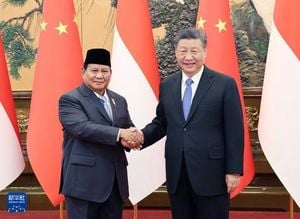AstraZeneca has officially cancelled its planned £450 million investment to expand its vaccine manufacturing plant located in Speke, Liverpool, marking a significant setback for the UK government’s aspirations to bolster its life sciences sector. This announcement came on January 31, 2025, leaving behind questions about the future of vaccine production and job creation within the region.
The pharmaceutical giant attributed its decision to inadequate financial support from the newly elected Labour government, which it claims failed to maintain the incentives promised by the previous Conservative administration. A spokesperson for AstraZeneca stated, "Following discussions with the current government, we are no longer pursuing our planned investment at Speke. Several factors have influenced this decision including the timing and reduction of the final offer compared to the previous government’s proposal."
Initially, the Conservative government had promised support for this major investment during then-Chancellor Jeremy Hunt’s budget speech last March. The plan was part of broader efforts to establish the UK as a leader in vaccine production, aiming to prepare for future pandemics and improve public health resilience. The Speke site was expected to not only produce the next generation of flu vaccines but also create 100 new jobs, increasing its workforce from 400 to 500 employees.
Despite the project’s potential impact, the Labour government’s recent moves to recalibrate economic policies have raised alarm among businesses. Chancellor Rachel Reeves had hoped to reinvigorate business confidence with her growth agenda, yet AstraZeneca's withdrawal highlights the hurdles still present. Andrew Griffith, the Shadow Business Secretary, criticized the government's handling of the deal, stating, "There’s no vaccine for incompetence. Labour seem to have fumbled a deal with AstraZeneca, one of the UK’s largest companies and central to the life sciences sector."
The Labour government’s proposal to scale down the grant offered to AstraZeneca from £90 million to £40 million was particularly contentious, with significant repercussions for how businesses perceive the UK as an attractive investment destination. Griffith's refusal to let current administration's missteps go unnoticed carries weight, particularly as critics argue the government has dampened opportunities by raising national insurance contributions and modifying employment rights.
Former health secretary Matt Hancock has chimed in, pointing out the need for improved domestic manufacturing capabilities for vaccines. He declared during the Covid Inquiry earlier this month, "Having domestic vaccine manufacturing capacity is 'critical' for pandemic preparedness," emphasizing the growing concerns over national health security.
Despite the cancellation of this expansion, the existing Speke facility will continue to operate, producing the flu vaccine which AstraZeneca currently manufactures alongside its partnering site located in Philadelphia, USA. This site is regarded as the second largest biologics manufacturing location within AstraZeneca’s network and plays a pivotal role as a center of excellence for drug testing and certification.
Labour MP Maria Eagle, whose constituency encompasses the Speke site, previously expressed her support for any developmental initiatives at the facility, highlighting its potential benefits for both local communities and national pandemic preparedness strategies. She stated, "I will support in any way I can their expansion plans. It would be good for the country in terms of resilience against future pandemics and for the local community. I hope the Government will support them to enable this development to go ahead."
While the UK government indicated it will not support AstraZeneca’s proposed investment due to the need for grant funding to reflect value for taxpayers, the company's future engagements with government initiatives remain uncertain. A spokesperson for the government noted, "All government grant funding has to demonstrate value for the taxpayer and, unfortunately, it has not been possible to achieve a solution."
The decision by AstraZeneca is particularly disheartening for the Government, especially as Chancellor Reeves was actively working to project confidence among potential investors. This setback not only dampens hopes of economic resurgence but also poses serious questions about the UK’s strategy to nurture the life sciences sector, which contributes £108 billion annually to the economy and accounts for over 300,000 highly skilled jobs nationwide.
AstraZeneca's sustained engagement with the UK’s new industrial strategy will be closely observed, as the government attempts to regain footing and assure businesses of its commitment to supporting the life sciences industry moving forward. This situation serves as yet another reminder of the delicate balance between government policy, business investment, and public health preparedness.



